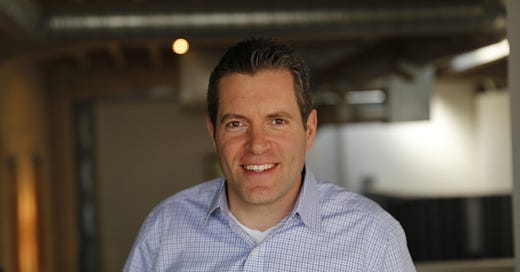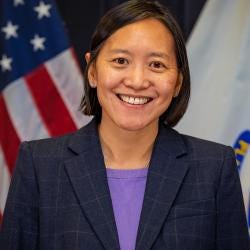State watchdog slams T for shoddy accounting | Pot commission battles to hide damning report | For better or worse, AI grabbing the attention of Mass. lawmakers | Sign up today for Contrarian Boston’s webinar on the future of downtown Boston | Top Boston planner leaving city |
News tips? Story ideas? Email us at sbvanvoorhis@hotmail.com
Does AI need guardrails? As deepfakes proliferate, key state senator is readying bill to regulate the explosively growing technology
The AI train - with its potential for trillions in global growth - is leaving the station, and Massachusetts is scrambling to clamber aboard while there is still time.
The Healey administration has created an official “AI hub,” while state lawmakers have given a green light to tax incentives for the development of the massive data centers on which the new technology depends.
But here comes the trickier part: Along with looking to fuel a budding AI sector in Massachusetts, the state Legislature now wants to start regulating the field as well.
State Sen. Barry Finegold is putting the finishing touches on legislation with safeguards aimed at heading off potential abuses or problems in the use of the new technology.
At a gathering Wednesday of top real estate executives and developers in Boston, Finegold lamented that the state had missed the boat when it came to regulating social media platforms 10 or 15 years ago, when they were starting to explode in popularity.
“We are filing a much more comprehensive bill to put some guardrails up similar to what California has done,” Finegold said at the NAIOP Massachusetts meeting on economic development issues.
The Andover Democrat, who is the Senate chair of the Joint Committee on Economic Development and Emerging Technologies, declined to offer additional details on exactly what measures he is looking at when asked by Contrarian Boston.
However, California enacted several AI regulatory bills last fall, including one that requires AI developers to post on their websites documentation that outlines the data used to train their systems.
Other bills signed into law would require social media platforms to remove AI deepfakes related to elections and make it a criminal act to attempt to blackmail someone with AI-generated deepfake nudes.
For her part, Yvonne Hao, the state secretary for economic development, said the AI boom is in its early stages, similar to where the internet was in 1995.
“AI is not a fad - it is going to have a transformative effect on so much that we do,” Hao said at the NAIOP Massachusetts event.
Elizabeth Mahoney, government affairs chief for the Massachusetts High Technology Council, told Contrarian Boston that she will look closely at the senator’s bill when it is filed.
She agreed in general with the idea that guardrails could be helpful for the budding AI sector, and that tech companies, like other businesses, want to have clear “rules of the road” to follow.
But she also noted that having states - as opposed to the federal government - take the lead in regulating AI could pose some challenges.
“How do we make sure that there is a very clear set of rules and that we are not setting up 50 different sets of rules for companies to comply with?” Mahoney asked.
Contrarian Boston webinar alert/Register today
Click here to join us and look forward to seeing you then.
City Hall turbulence: A top Boston planner is leaving her post as neighborhood backlash grows over a new downtown development plan
Aimee Chambers, Boston’s planning and zoning director, will leave her job at the end of the month, Contrarian Boston has learned.
Keep reading with a 7-day free trial
Subscribe to Contrarian Boston to keep reading this post and get 7 days of free access to the full post archives.







